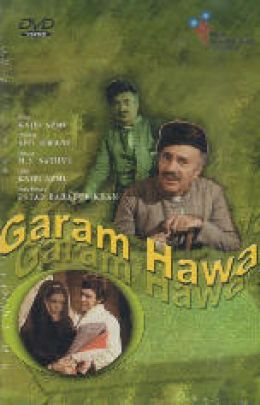
As entertainment journalists, we are often either oblivious or averse to crucial occurrences around us. Shamelessly busying ourselves into glossy gossips or bitter cat fights in Bollywood, our understanding of cinema frequently gets limited to the films which hit the benchmark of the celebrated 100 crore club. We barely question or ponder beyond the balance sheets these days.
It was while watching Abhishek Kapoor’s recent little delightful venture Kai Po Che! that I thought of this film. Though antagonistic cultures, why is the Hindu-Muslim religious divide still valid enough for us to be the theme of a popular film? The answer is not recent, is deep rooted in the intricacies of our turbulent history. And in the light of that, this week I recommend to you, Balraj Sahani and Farooq Sheikh starrer 1973 classic film Garam Hawa.
Garam Hawa is directed by M.S Sathyu, the film is based on an unpublished short story by Ismat Chugtai. Set against the backdrop of the 1947 Partition, the film’s screenplay was jointly penned down by Kaifi Azmi and Shama Zaidi, Sathyu’s wife. Fair enough, we have seen enough Partition based films. Contemporaries or Classics, mainstream films or art films, Partition has often played a favorite plot, thrilling enough to interest scriptwriters in our country. But it is not very often, we see a Muslim protagonist’s plight because he chose to stay back in India despite all visible odds.
The film begins with Salim Mirza played by the seasoned actor Balraj Sahani seeing off his relative at the station. The tonga man there simply asks, “Aaj kisko chodne aaye the?” Faced with the pressures and pangs of Partition, Muslims gradually left India for a land of better prospects and mostly more equitable treatment. Ostracized by people, abandoned in their own country, Pakistan looked appealing to most for its promise of a brighter future for Indian Muslims.
Salim Mirza had a shoe manufacturing business in Agra which is running in heavy losses following the post-Partition economic crisis added with a clear religious discrimination. Salim, a pious man of convictions believes staunchly in the ideals of peace and harmony. He passively stands by watching his family leave one by one. His brother Halim and his family, his elder son and his family, his daughter’s suitors – they all migrate to Pakistan. Letters from the other side of the border tells Mirza’s family of the glories and happiness of the promising new land that provides so amply for the Muslims, way better than India.
Salim still stands by his beliefs despite waging a hopeless war against all who constantly prod him to leave for Pakistan. With his business and ancestral home confiscated by the Government, and then his daughter Amina’s suicide following multiple heartbreaks of her suitors going back on her – Salim finally makes the exasperated call which he had been avoiding all along. He decides to leave India. And then there’s an appalling ending which fosters a reinvigorated faith in the postulates of Democracy, not to mention a refreshed sense of respect for the likes of Salim Mirza. The final lines of the film by Kaifi Azmi very poignantly express,
“Jo door se toofan ka karte hai nazara, unke liye toofan vahan bhi hai yahan bhi… Daare me jo mil jaoge ban jaoge daara, yeh waqt ka ailaan vahan bhi hai yahan bhi“
Sathyu’s directorial debut ran into troubled waters and its release was delayed and evaded for months! Contemplating communal disturbances, the film was received with both critical and commercial success upon its release. Salim Mirza is deemed to be Balraj Sahani’s finest performance ever. His charisma almost single handedly pulls through the film.
This movie might sound like a long lecture to the urban modern youth, whose largely self oriented grievances of relationships and love formulate the themes of most Bollywood films today. Recent films have better camera work, ornate frames, and fancier foreign locales and still don’t manage to strike a chord.
This film doesn’t have any of those lustrous elements. But I recommend this film solely for a humane story that will overwhelm you. It draws attention to the plight of a myriad people so easily forgotten. Of course, it might sound like clawing on to our past too hard, and yet films like these give a wider insight into our present social scenario.
With tall talks of combating terrorism with Hindutva, this film will convey the mere need for Secularism; need to be religiously fair in a country so full of ethnic diversities. Garam Hawa is a salute to the immense strength of many sufferers of Partition to sustain such brutal pressures and survive in a country which has more often than not marginalized them with great hostility. As Indians, we audaciously sympathize and recklessly ostracize people based on religion, sadly till date.
Let this film hammer you hard this weekend and preach to you the importance of an equalitarian and just society, from a perspective Bollywood cinema has mostly kept alien from us.



 Follow Us
Follow Us







